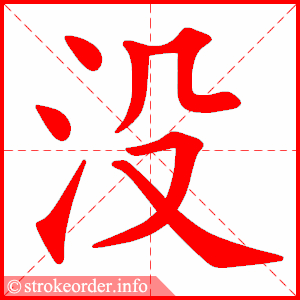Animated Stroke Order of 没:

Radical:氵 Strokes:7
Pinyin & Definition:
| méi | (negative prefix for verbs)/have not/not |
| mò | drowned/to end/to die/to inundate |
Related Chinese characters:
Words with Chinese Character 没:

| méi | (negative prefix for verbs)/have not/not |
| mò | drowned/to end/to die/to inundate |
| 没 | (negative prefix for verbs) have not not |
| 没…没… | used before two synonyms to emphasize the sense of "without" |
| 没上没下 | no respect for seniors lacking in manners |
| 没世 | through one's life-time; all one's life; lifelong |
| 没世不忘 | I shall not forget it in my life |
| 没主意 | lose one's head; cannot make up one's mind |
| 没了 | to be dead not to be, or cease to exist |
| 没事 | it's not important it's nothing never mind |
| 没事人 | person unconcerned |
| 没事儿 | to have spare time free from work it's not important |
| 没事找事 | ask for trouble; ask for it; fault-finding |
| 没亲没故 | without any relatives or friends |
| 没人住 | unoccupied |
| 没人味 | to be lacking in human character |
| 没人味儿 | erhua variant of 沒人味|没人味 |
| 没什么 | variant of 沒甚麼|没什么, nothing it doesn't matter it's nothing |
| 没关系 | it doesn't matter |
| 没准儿 | not sure |
| 没出息 | not promising; good for nothing; not promising |
| 没分寸 | inappropriate bad-mannered |